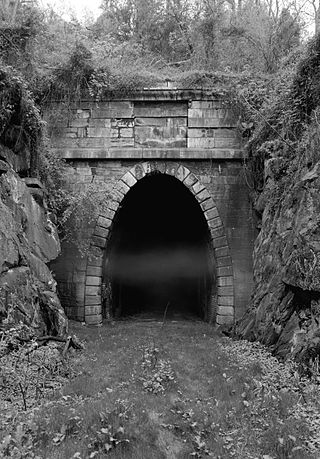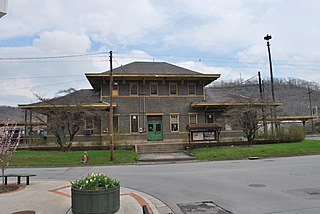
Huntington is a city in Cabell and Wayne counties in the U.S. state of West Virginia. The county seat of Cabell County, the city is located at the confluence of the Ohio and Guyandotte rivers. Huntington is the second-most populous city in West Virginia, with a population of 46,842 as of the 2020 census. Its metro area, the Huntington–Ashland metropolitan area, is the largest in West Virginia, spanning seven counties across three states and having a population of 376,155 at the 2020 census.

Thurmond is a town in Fayette County, West Virginia, United States, on the New River. The population was five at the 2020 census. During the heyday of coal mining in the New River Gorge, Thurmond was a prosperous town with a number of businesses and facilities for the Chesapeake and Ohio Railway.

The Chesapeake and Ohio Railway was a Class I railroad formed in 1869 in Virginia from several smaller Virginia railroads begun in the 19th century. Led by industrialist Collis P. Huntington, it reached from Virginia's capital city of Richmond to the Ohio River by 1873, where the railroad town of Huntington, West Virginia, was named for him.

The Virginia Central Railroad was an early railroad in the U.S. state of Virginia that operated between 1850 and 1868 from Richmond westward for 206 miles (332 km) to Covington. Chartered in 1836 as the Louisa Railroad by the Virginia General Assembly, the railroad began near the Richmond, Fredericksburg and Potomac Railroad's line and expanded westward to Orange County, reaching Gordonsville by 1840. In 1849, the Blue Ridge Railroad was chartered to construct a line over the Blue Ridge Mountains for the Louisa Railroad which reached the base of the Blue Ridge in 1852. After a decision from the U.S. Supreme Court, the Louisa Railroad was allowed to expand eastward from a point near Doswell to Richmond.

The Blue Ridge Tunnel is a historic railroad tunnel built during the construction of the Blue Ridge Railroad in the 1850s. The tunnel was the westernmost and longest of four tunnels engineered by Claudius Crozet to cross the Blue Ridge Mountains at Rockfish Gap in central Virginia.

Alexandria Union Station is a historic railroad station in Alexandria, Virginia, south of Washington, D.C. To avoid confusion with nearby Washington Union Station, the station is often referred to as simply Alexandria. Its Amtrak code is ALX.

The Western Maryland Railway was an American Class I railroad (1852–1983) that operated in Maryland, West Virginia, and Pennsylvania. It was primarily a coal hauling and freight railroad, with a small passenger train operation.

Richmond Main Street Station, officially the Main Street Station and Trainshed, is a historic railroad station and office building in Richmond, Virginia. It was built in 1901, and is served by Amtrak. It is also an intermodal station with Richmond's city transit bus services, which are performed by Greater Richmond Transit Company (GRTC). The station is colloquially known by residents as The Clock Tower. It was listed to the National Register of Historic Places in 1970, and in 1976 was made a U.S. National Historic Landmark. Main Street Station serves as a secondary train station for Richmond providing limited Amtrak service directly to downtown Richmond. Several Amtrak trains serving the Richmond metropolitan area only stop at the area's primary rail station, Staples Mill Road which is located five miles to the north in Henrico County.

Ashland Transportation Center is an intermodal transit station in Ashland, Kentucky. Jointly operated by the City of Ashland and CSX Transportation, it currently serves Amtrak's Cardinal train as well as the Ashland Bus System, Greyhound Lines, and regional shuttles. It is located at 99 15th Street near downtown Ashland.

Newport News station is an Amtrak inter-city train station in Newport News, Virginia. The station is the southern terminus of two daily Northeast Regional round trips. It has a single side platform adjacent to a large CSX rail yard. An Amtrak Thruway motorcoach connection to Norfolk station effectively doubles the frequency between each station and Washington.

The Virginia Museum of Transportation (VMT) is a museum in Downtown Roanoke, Virginia, that is devoted to the topic of transportation.

Prince station is an Amtrak station in Prince, West Virginia, served by the Cardinal. It serves as the main depot for the Beckley area because it is on the CSX mainline while Beckley itself is not.

Thurmond station is a train station in Thurmond, West Virginia, United States, that is served by Amtrak, the national railroad passenger system. The Cardinal, which runs three times each week between Chicago, Illinois and New York City, New York, passes by the station three times each week in both directions. The station is on CSX Transportation's New River Line and is located on the east bank of the New River.

Charleston station is an active intercity railroad station in Charleston, Kanawha County, West Virginia. Located on MacCorkle Avenue Southeast, the station services trains of Amtrak's Cardinal between New York Penn Station and Chicago Union Station. The two trains, make stops in Charleston on Wednesdays, Fridays and Sundays. Charleston station contains a single 800-foot (240 m) concrete side platform and has a station depot that provides a waiting room for customers.

The Cincinnati, Richmond & Muncie Depot is a restored train station in Muncie, Indiana, United States. Built in 1901, it was acquired by the Chesapeake and Ohio Railway in 1910. The station was used for passenger train service throughout the 20th century and was added to the National Register of Historic Places in 1997. It is currently used as a visitor center and office for the adjacent Cardinal Greenway.

The Peninsula Extension which created the Peninsula Subdivision of the Chesapeake and Ohio Railway (C&O) was the new railroad line on the Virginia Peninsula from Richmond to southeastern Warwick County. Its principal purpose was to provide an important new pathway for coal mined in West Virginia to reach the harbor of Hampton Roads for coastal and export shipping on collier ships.

Marlinton Chesapeake and Ohio Railroad Station was a historic railway station and bunkhouse located at Marlinton, Pocahontas County, West Virginia. They were built in 1901 by the Chesapeake and Ohio Railway. The station was a frame, rectangular, one-story building measuring 76 feet by 16 feet and used for both passengers and freight. The bunkhouse is a one-story frame building measuring 24 feet by 16 feet. Both buildings featured vertical board and batten siding and decorative brackets in the wide projecting eaves of their gable roofs. Passenger service ended at Marlinton in 1958. Given its location at the trailhead of the Greenbrier River Trail, the station was renovated to house the Pocahontas County Convention and Visitors Bureau. The station was destroyed by fire in 2008; the bunkhouse remains extant.

The Flint & Pere Marquette Union Station, commonly known as the Potter Street Station, is a former railroad station built in 1881 and used until 1950 located at 501 Potter Street in Saginaw, Michigan, United States. It was designed by New York City architect Bradford Lee Gilbert. The station is 285 feet by 40 feet with 2½ stories.

Lee Hall Depot is a historic train station and museum located in the Lee Hall neighborhood of Newport News, Virginia. It was built in about 1881, with a one-story cargo bay, and the two-story main section was added in 1893. Another one-story wing was added by the Chesapeake and Ohio Railway to the north end of the depot in 1918 to handle an influx of military personnel to Fort Eustis. The building is currently in use as a local history museum, focusing on the station's history, and the history of the Chesapeake and Ohio Railway in Warwick County.

The Chesapeake and Ohio Railway Depot in Ronceverte, West Virginia is a historic train station built in 1915 and is part of the Ronceverte Historic District. The depot stopped serving to passengers when Amtrak started operation on May 1, 1971, and discontinued services to the station, although the line still has the Cardinal using the route. Currently, the depot serves as an office for CSX, the latter of which is restoring the station at the cost of $500,000.






















